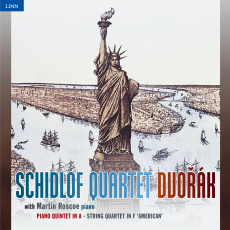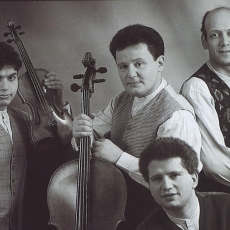Dvorak - Schidlof Quartet - HiFi News and Record Review
A stunning new coupling of two Czech favourites. collectors who read my interview with the Schidlof Quartet will realize that these performers do not try to emulate such celebrated ensembles as the Smetana, Janacek, Vlach, Kocian and Wihan Quartets who are individually concerned with Slovak traditions of phrasing, nuance and polished precision. Instead, they bring forth fresh meanings of poetry, drama, and in the fullest sense of establishing this composer's chamber music alongside the great works of Haydn, Mozart, Beethoven and Brahms. The Piano Quintet is quite different from any other performance I know, with all four players obeying Dvorak's markings, observing all repeats, balancing their inner parts in order that important solo roles are highlighted. The weight of Roscoe's playing at the first forte crescendo just 17 bars after start, startles by its impact. Here, the work takes on an orchestral concept, closer than perhaps we realise to Brahms to whom Dvorak owed so much, but lyrical in its alternate answering phrases above as it progresses. Sound balance favours each instrument in turn and en masse, the autumnal features coming through the textures when the viola takes up the melody to quiet quaver triplets accompaniment. Nothing is more mysteriously serene than the largamente section, until interrupted by forceful piano chords (letter M) and two groups of swirling arpeggios scales reminding us of Schubert, that lead on to the dramatic coda. In keeping with this opening movement, the next three - Dumka, Scherze (Furiant) and Finale, 22 pages of intense exhuberance in top gear, find the performers in magnificant form. Artia's score timimg at 28m.15 is way out; in their 'completeness' the Schidlof pace the music to an overall 40 minutes without any lingerings en route! Opus 96 is in complete contrast with persuasiveness, cajollery and loving tenderness forming the framework of their vision, a broadcast reminder of Misha Donat arguing with the late Hans Keller that mature Dvorak was just as lyrical and masterly on a sustained level as his great German Predecessors.
The smooth transition from unbroken melody to the composer's joyous and boisterous glee at finding a warm welcome in the New World find the perfect counterpart in Linn's demonstration recording.

